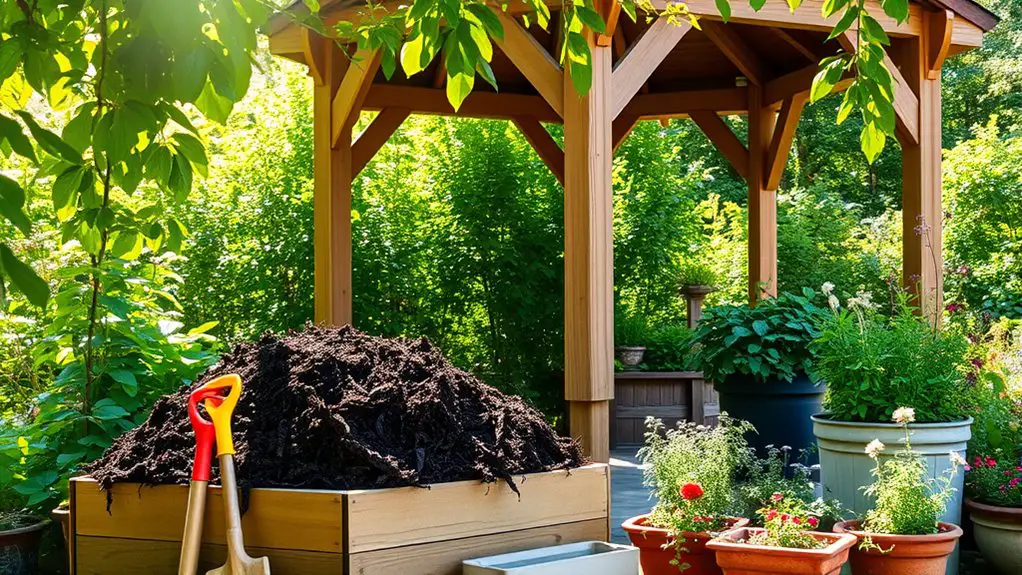To set up a composting station near your gazebo, find a sunny spot with good drainage and airflow. Choose a bin that suits your space—tumblers for quick composting or stationary bins for larger amounts. Include kitchen scraps, grass clippings, and eggshells while avoiding meat and dairy. Layer greens and browns for balance, and remember to turn the pile regularly. With a bit of care, you can create nutrient-rich compost. Learn how to maximize this process for your garden!
Choosing the Right Location for Your Composting Station
Choosing the right location for your composting station is essential for maximizing efficiency and minimizing odors. First, consider sunlight exposure; a sunny spot helps speed up the decomposition process, keeping your compost healthy and active. However, too much direct sunlight can dry it out, so balance is key. Next, pay attention to drainage considerations. You’ll want a location that allows excess moisture to escape, preventing your compost from becoming soggy and smelly. An area with good airflow will also promote quicker breakdown. If you can, place your station near your gazebo for easy access while enjoying nature. With the right spot, you’ll create nutrient-rich compost effortlessly, embracing your eco-friendly lifestyle and nurturing your garden.
Selecting the Appropriate Compost Bin
After you’ve found the perfect spot for your composting station, the next step is selecting the right compost bin. There are several compost bin types to evaluate, including tumblers, bins, and piles. Tumblers are great for quick composting, while stationary bins are easier to manage for larger amounts. When it comes to compost bin materials, you can choose from plastic, wood, or metal. Plastic bins are lightweight and durable, while wooden bins blend well with your garden aesthetic. Metal bins offer sturdiness but may rust over time. Think about your space, the amount of compost you’ll produce, and your personal style when choosing the right bin. This way, you’ll create a sustainable composting environment that suits your needs.
What to Compost: Materials to Include and Avoid
Understanding what materials to compost is essential for successful composting. You’ll want to include a mix of kitchen scraps and yard waste while steering clear of certain items that can hinder the process. Let’s explore the compostable materials you should use, the non-compostable items to avoid, and some best practices for maintaining a healthy compost pile.
Compostable Materials Overview
Composting is a fantastic way to reduce waste while enriching your garden soil, but knowing what materials to include and avoid is essential for success. Utilizing the right compostable materials can greatly enhance the benefits of composting. Here’s a quick list of items you can add to your compost:
- Fruit and vegetable scraps
- Coffee grounds and filters
- Grass clippings
- Eggshells
- Shredded newspaper
These materials break down easily, providing nutrients for your plants. Remember, balance is key; aim for a mix of “greens” and “browns” to keep your compost healthy. By choosing the right compostable materials, you’re not just reducing waste—you’re creating a sustainable cycle that supports your gardening goals and the environment!
Non-Compostable Items List
A successful composting station relies not only on what you include but also on what you leave out. To maintain an effective compost, steer clear of non-compostable items. These include meat, dairy, oils, and processed foods, which can attract pests and create odors. Additionally, avoid items like plastic, glass, and metals, as they don’t break down and complicate waste management. Certain yard waste, such as diseased plants or weeds with seeds, should also be excluded. By following recycling guidelines and understanding what to avoid, you can create a thriving compost that benefits your garden. Remember, knowing what not to compost is just as important to your eco-friendly efforts as the materials you do choose to include.
Best Practices for Composting
Knowing what to exclude from your compost is just the first step; what you include is equally important for creating a healthy composting system. Utilizing effective composting methods can maximize composting benefits, enriching your garden and reducing waste. Here are some materials you should include:
- Fruit and vegetable scraps
- Coffee grounds and filters
- Grass clippings
- Dry leaves and twigs
- Eggshells
Avoid adding meat, dairy, or oily foods, as they can attract pests. By focusing on the right materials, you’ll create nutrient-rich compost that supports plant growth. Embrace this eco-friendly practice, and enjoy the freedom of recycling organic waste into a valuable resource for your garden!
Building Your Composting System
Creating an effective composting system requires careful planning and the right materials. Start by selecting suitable building materials, like wood pallets, wire mesh, or compost bins, depending on your space and style preferences. Consider your compost design; a simple bin with good airflow works well for beginners. Make certain your system is easily accessible and fits snugly near your gazebo for convenience. You’ll want to layer greens, like fruit scraps, with browns, such as dried leaves, to achieve a balanced mix. Remember to leave room for air circulation, as this helps speed up the composting process. With a little effort, you’ll enjoy the freedom of turning kitchen waste into nutrient-rich soil, enhancing your garden’s health and sustainability.
Maintaining Your Compost: Tips for Success
While composting can seem straightforward, maintaining your compost is essential for turning your kitchen scraps into rich, usable soil. Here are some tips to help you with compost maintenance and troubleshoot any issues that arise:
- Turn your pile regularly: Aerating helps speed up decomposition.
- Monitor moisture: Keep it damp but not soggy; add water or dry materials as needed.
- Balance greens and browns: Aim for a mix of nitrogen-rich greens and carbon-heavy browns.
- Watch for odors: A foul smell can indicate too much nitrogen or insufficient aeration.
- Be patient: Composting takes time; don’t rush the process.
Utilizing Finished Compost in Your Garden
Once your compost is ready, you can access its potential by incorporating it into your garden. Using finished compost offers numerous garden benefits, enriching your soil with nutrients and improving its structure. For effective compost application, mix it into the soil before planting, or use it as a top dressing around established plants. This boosts moisture retention and encourages healthy root development.
You can also create a nutrient-rich compost tea by steeping compost in water, providing an easy way to nourish your plants. Embracing these eco-friendly practices not only enhances your garden but also fosters a sustainable lifestyle. So, immerse yourself in your garden with that homemade goodness, and watch your plants thrive, enjoying the freedom of growing your own food!
Frequently Asked Questions
Can I Compost Pet Waste in My Composting Station?
You shouldn’t compost pet waste due to composting safety concerns. It can harbor harmful pathogens. Instead, consider a separate composting method designed for pet waste, ensuring your garden remains healthy and eco-friendly while maintaining freedom from hazards.
How Often Should I Turn My Compost Pile?
Turning your compost pile daily won’t magically create compost overnight, but it’ll speed up decomposition. Aim for every 1-2 weeks to maximize compost benefits. Experiment with compost techniques to find what works best for your eco-friendly lifestyle.
What Is the Best Time of Year to Start Composting?
The best time to start composting’s during spring planting or after autumn cleanup. Both seasons provide ample organic material, helping you create rich compost. It’s a sustainable way to recycle while enhancing your garden’s health.
Can I Compost Kitchen Scraps From Cooked Food?
While composting kitchen scraps from cooked food can be tempting, it’s best to avoid them due to odors and pests. Instead, focus on raw kitchen waste for composting benefits, ensuring an eco-friendly process.
How Long Does It Take for Compost to Be Ready?
Compost maturity timeline varies, but generally, it takes three to six months. The composting process stages include decomposition, curing, and stabilization. Regularly turning your pile speeds up this natural, eco-friendly transformation into nutrient-rich soil.

